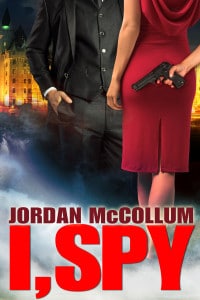My heart-wrenching tale of THISCLOSE
If you’ve poked around my site or been a subscriber for a while, you might remember that in November 2011, I received an offer of publication from a regional publisher, with a 2013 anticipated release. (If you happen to remember the name of my publisher, please refrain from naming names. I’ll do the same.*) Like any publishing offer, it was a long time coming.
Three years and two weeks after I started the novel. Two years after I submitted it to the same publishing house the first time (obviously they rejected it, and with good reason). Eighteen months after an editor at the publishing company told me not to bother resubmitting the revised, newly-award-winning manuscript. Almost nine months after I went ahead and did it anyway.
I got the good news at a writers’ retreat and I was so excited to share with my friends there. After seeing other friends have contracts fall through, I’d always vowed that I wouldn’t make any announcements until after the contract was signed. But the contract would be months in coming—in one author’s experience, they had printed books waiting to be distributed before they got the contract signed.
I went ahead and made the announcement. So many wonderful friends celebrated with me. It was great. (I finished the manuscript I’d just started when I got the good news.)
While we waited on that contract, they assigned me an editor, who happened to be someone I’ve wanted to work with for a long time. They asked me for the “final” submitted version of my manuscript (although editing was at least a year away). They requested an author photo, then a release from my amazing photographer. They needed tax documents. I got it all turned in.
Finally, the contract came in the mail. I held my breath as I opened that big white envelope and read through those pages with my publisher’s name and mine. And I cried.
But they weren’t tears of joy.
(I wrote another novel.) With a friend’s recommendation, I consulted with a lawyer who specializes in contract disputes and intellectual property law. He spent looong billable hours reading the contract and writing me an extremely thorough analysis. And, yeah, it was as bad as I feared.
Worse.
The deal breaker
In the olden days (ten years ago), a book had a fairly short lifespan: a few months to make or break its print run, languish on the shelves a few more months, then the bargain bin, then it went out of print. After a certain period of time “out of print,” the rights to the book reverted to the author. Hundreds of authors who had trade published books revert to them now have those same books for sale forever as ebooks.
Naturally, I was very worried about the possibility of a book never being declared “out of print” because the publisher had an ebook version on the “shelves.” I might never get the rights to my backlist back unless the publisher was feeling very generous. (We actually did reach a minor compromise on this issue, for shared rights.)
But my lawyer was more concerned with another issue, one that I was anticipating, but didn’t think it would be as bad as the reality. The contract demanded the right of first refusal on basically everything I might write for the next 21 years. If I submitted any work anywhere else, it would be deemed accepted by this publisher, and contractually obligated to them first. There was no timeline in the original contract, meaning they could spend three years sitting on my manuscript, before granting me one year to try to find someone else to take it (after which the time frame and rejection process would start over).
In my opinion, the legal term for that clause would be “unconscionable.” For comparison, SFWA president John Scalzi publicly ripped apart a different trade publishing contract with less restrictive clauses (see his points 0, 1, 4, 5, and 6, but STRONG LANGUAGE). Even within the publishing world, these clauses are beyond the pale.
After consulting with my lawyer on how best to proceed with negotiations, I did what I could. I didn’t ask for a single cent more, no advance, no more royalties. I didn’t ask for my audio, film or foreign rights. I didn’t ask for the right to create my own subsidiary works. I pointed out I had four manuscripts all ready to submit to them. I offered options, options I knew other authors had gotten added to their contracts with this company, and options I knew other publishers used. I gave some, and they gave a little.
Ultimately, however, they wouldn’t budge on the most important issue. They did tell me that if I had a book under contract with another publishing house, they’d revise that ROFR clause (of necessity). I didn’t. My contract with this publisher went on hold while I pursued publication for another book. My editor left publishing for law school. I took my publication year, 2013, off my blog and social media profiles. Then the publisher’s name.
The emotional side
Yes, I did cry when I read the contract the first time. But when it came down to it, this was a business decision. There was no way I could sign over control of my entire career for more than two decades. Even if this was to be my one and only chance, if it came down to a choice between never, ever publishing a book, or taking that contract as it stood, I would rather never publish.
(I also wrote another book. I wrote the first draft of this post. Then I wrote a novella.)
The end
I spent literally years holding out for a better contract. I self-published that second novel I wrote since receiving the offer and the novella and a sequel to each. Both novels were named finalists for the most prestigious award in that regional market (being 2 out of 5 of the finalists). Even after all that, I sent a final message to the publisher. I told them I didn’t want to burn any bridges, but I would need to see changes to these clauses of the contract.
They said no.
So I said no.
I did the unthinkable: I walked away from a publishing contract. I rejected my publisher and published myself. I didn’t (and don’t) need a publisher to turn out top caliber books or even get them to bookstores. I didn’t have to sacrifice my control over my career, my vision for my books or my artistic integrity. It was nice to have the external validation of a publishing offer, but in the end, I didn’t need them to share my stories, and the costs of using their services instead of contracting my own far exceeded the benefits, especially when it came to my career. Shockingly, I’ve made almost as much as I would have anticipated making from going with them, and I still have all my rights and control of these books—and my career.
What do you think? What would it take for you to walk away from a publishing contract?
ADDENDUM: I’m not naming the publisher because the principle I’m hoping to get across—that authors need to be careful of contracts and guard their rights, and be willing to walk away from a publisher who won’t do that—is more important than punishing the publisher. 90% of my audience isn’t going to submit to this small press anyway.
Due to an influx of spam, I’ve had to close comments on this post.
Photo credits: CONTRACT—Steve Snodgrass; thumbs down—Striatic, via Flickr/CC
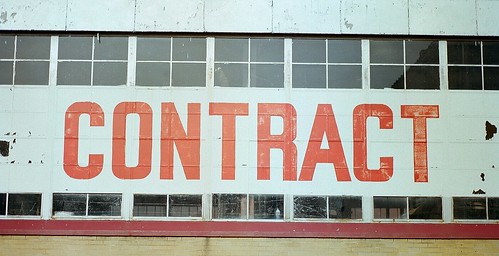
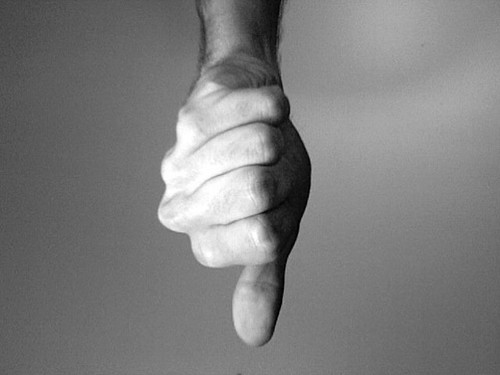


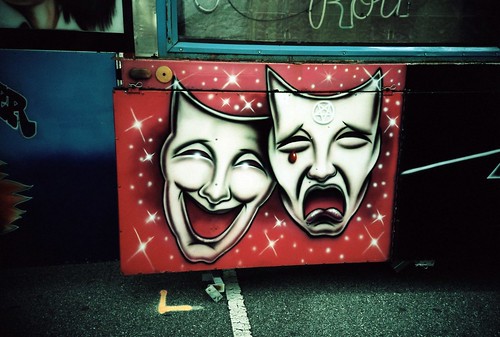





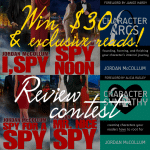 Author Anna del C featured an
Author Anna del C featured an 



